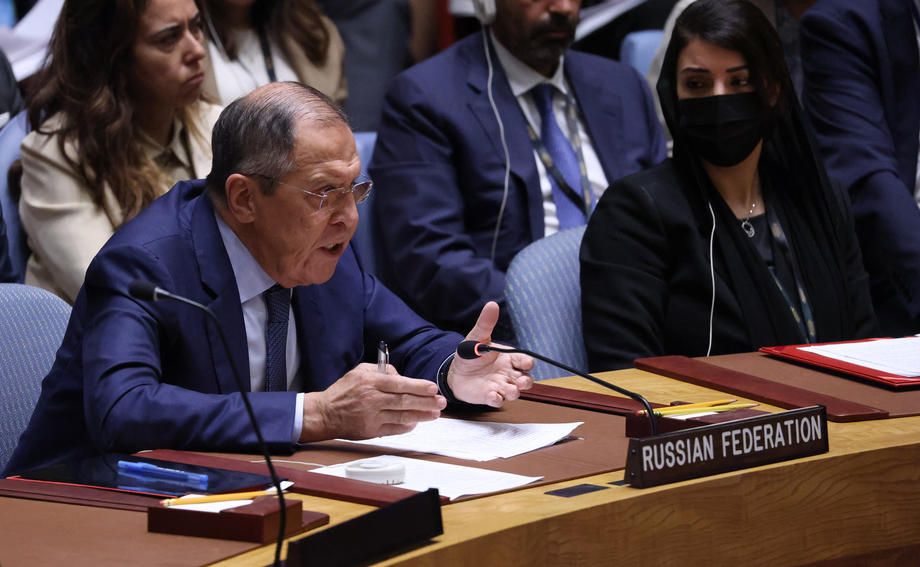7 reasons NOT to support a Special Tribunal (& why these excuses are nonsense)
No, we don't have to choose between peace and justice. One is not possible without the other.

This was originally meant to be an article outlining the case in favour of a special tribunal for Russian aggression. But everyone appalled by Russia's war against Ukraine knows that there should ideally be justice.
The problem is not that we need to convince people of the need for justice. The problem is that there are too many excuses used to deter the world from pursuing it.
So here's 7 of the most common excuses you are likely to encounter while supporting #SpecialTribunalNow - and why they are nonsense.
Excuse 1: "Justice can only be pursued when aggressors are militarily defeated"
TL;DR: That's not what happened in World War 2 and not what needs to happen today.
The decision to prosecute the Nazis for their aggression and war crimes, resulting in the Special Tribunal at Nuremberg, was made in 1942 during the very darkest hours of the Second World War when victory over the Nazis was very far from certain.
That’s when representatives of occupied and allied nations agreed that the only way to end the cycle of aggressive wars was through international law and having the proper judicial mechanisms to enforce it.
No doubt there would have been naysayers at the time arguing it was pointless to talk about justice while Hitler and his army was rampaging across Europe and that perhaps justice would somehow just undermine peace negotiations with them.
But their words in 1942 remain eerily relevant today:
“Would we win only to live in dread of yet another war? Should we not define some purpose more creative than military victory? Is it not possible to shape a better life for all countries and peoples and cut the causes of war at their roots?”
This focus on justice for international crimes formed part of the Declaration of St James’ Palace, a process that started the previous year. Their declaration formed the first draft of what is now the UN Charter, the document that underpins our rules-based system of sovereign nations peacefully cooperating after centuries of warring empires.
We have even less excuse to delay seeking justice compared to those in 1942 because we are not starting from scratch. They have already established the institutions, principles, and mechanisms to achieve justice. And we live in a far more interconnected world where sanctions from the international community arising from the pursuit of justice do have an impact, as we have already seen with the ICC charges for the removal of children from Ukraine.
As Nuremberg prosecutor Ben Ferencz explained, Russia's leaders "do not live on the moon" so they can of course be prosecuted by the international community for international crimes.
Excuse 2: "A Special Tribunal is just not a viable option"
TL;DR: The world's leading experts on international law, like former Nuremberg prosecutor Ben Forencz and former UN General Secretary Ban Ki-moon, say it is entirely viable and urgently necessary.
International law states that a Special Tribunal with the clear backing of the international community would have the authority to prosecute the crime of aggression - even against individuals with immunities, like Heads of State. And regardless of whether their country is party to the Rome Statute.
That clear backing of the international community can come in the form of a UN General Assembly resolution recommending the creation of a Special Tribunal and authorising the Secretary General to begin negotiations with Ukraine to establish it.
Ordinarily, the UN Security Council would do this job when there is a serious international crime that threatens peace - but Russia has a veto there. However, the UN Charter makes it clear that it’s then the job of the UN General Assembly to act if the Security Council is unable due to a veto.
The UN General Assembly has demonstrated its authority in this way before, such as in the case of the Special Court for Sierra Leone.
A UN General Assembly resolution on a Special Tribunal would require a two thirds majority from member states present and taking part in the vote. Arrangements between the UN Secretary General and Ukraine to create this special tribunal could then proceed immediately after the vote.
Excuse 3: "The UN General Assembly wouldn't support it"
TL;DR: The UN General Assembly has already condemned Russia's war of aggression against Ukraine - repeatedly and overwhelmingly - and Special Tribunal campaigners within the General Assembly says momentum is building, hence why our vocal support is needed.
Momentum towards a Special Tribunal is continuously building in ways no one would have predicted last year.
In the first months of Russia's full scale war against Ukraine, few were talking about any kind of justice at all - with the very notable exception of leading peace activists and experts on international law.
Governments and lawmakers thought it was unrealistic to even broach the subject, let alone get into the details of how it could happen through a Special Tribunal and with the backing of the UN General Assembly.
That has changed dramatically with lawmakers around the world increasingly convinced of the need to pursue meaningful justice in light of Russia's worsening aggression, as well as Ukraine's continued resistance.
Meanwhile, Russia's aggression against Ukraine has already been condemned by the overwhelming majority of UN member states in the UN General Assembly - in March 2022, October 2022, February 2023, and April 2023.
The logical next step for them now is to recommend the creation of a Special Tribunal. That only requires a two thirds majority of member states present and voting.
The Baltic countries of Estonia, Latvia, and Lithuania were the first governments to specifically back a Special Tribunal authorized by the UN General Assembly. They’ve pointed out that in their private discussions with other representatives at the UN General Assembly, reluctance to pursue justice has been receding while there is no outright rejection of the proposal but rather considerable support for measures perceived to preserve the UN Charter and its legal order.
It once again reminds us that all that’s missing is the political will, which everyone, everywhere around the world can help change. That's all the more reason to keep pushing ever louder for a #SpecialTribunalNow.
Excuse 4: "Starting this process could weaken international law if it results in anything less than Putin going to jail in the near future"
TL;DR: International law is already being severely damaged. It is Russia's war of aggression that has weakened it. To not even attempt justice would significantly weaken it further.
Every stage towards justice reduces some of the damage to international law caused by Russia’s war of aggression.
When Russia's leaders are issued with arrest warrants for the crime of aggression then that alone still has far reaching consequences and sends a clear message about the sanctity of international law, even before they ever step foot in a court.
We see that with the ICC warrants over charges of removing children from Ukraine, which are already impacting Putin and his accomplices, as well as sending a clear message. If pursing justice against Putin isn't effective, as some would argue, then why is his regime so rattled already by the ICC warrants?
Hitler never faced trial. Does that mean efforts to seek justice against him were a failure? No. The Special Tribunal at Nuremburg was still crucial for advncing justice and ultimately ending his legacy.
In fact, we’ve got fewer excuses not to support a Special Tribunal than those who made the courageous decision to prosecute the Nazis. It is thanks to them that we have the international institutions and legal frameworks already place for it. We have benefited from that for 80 years. They had to invent their Special Tribunal from scratch. We know exactly how and why it must be done, and have the tools to do it.
Excuse 5: "We need to prioritise peace, not justice"
TL;DR: There is no meaningful peace without justice. Rewarding aggression merely leads to further aggression.
Russia has repeatedly made it clear that it commits further aggression and further atrocities in the absence of consequences. The increased momentum towards a Special Tribunal is based partly on the continued confirmation of that fact.
Justice is inevitable. The only question is how much more and worsening aggression and brutality the world is prepared to accept until then.
Delaying justice doesn't mean there will be a return to business as normal with those responsible for waging this war of aggression, especially considering the purpose of the war and the scale of crimes they are committing in Ukraine. It’s not worth throwing away international law only to embolden all aggressors in future.
Instead, as former UN Secretary General Ban Ki-moon argues, peace and justice must be pursued with equal vigor and in tandem.
Excuse 6: "International justice favours the West. What about other wars?"
TL;DR: The nature of Russia's war of aggression against Ukraine is unprecedented since the Second World War, but seeking justice for it will prevent future aggression globally.
There is one full scale war of aggression taking place in which an aggressor state has chosen to attempt the annihilation of another sovereign state. Changing borders by force breaks one of the most fundamental tenets of international law and norms as established after the Second World War.
Without justice for Ukraine, the aggression will be normalised and spread beyond Ukraine. The taboo against aggression as a tool of statecraft established at Nuremburg would be broken. Future aggressors around the world would be emboldened.
With justice for Ukraine, the world can choose a bold new era of peace. A Special Tribunal wouldn't just deter future aggression but also help close loopholes in international law.
Russia seeks to create a divide between "the West" and the "Global South" for exactly the kind of purpose as preventing a unified response to its aggression. In the case of a Special Tribunal, it is particularly nonsensical. Firstly, because the support for a Special Tribunal originated not from Western governments but from the world's most respected advocates for peace and international law, such as the Nelson Mandela-founded Elders group, Ban Ki-moon, and Ben Ferencz. Secondly, because prosecuting Russia for aggression means improving international law and tackling the loopholes, which were actually supported by many countries in the West.
Excuse 7: "A 'hybrid court' is more realistic than full justice"
TL;DR: Only a Special Tribunal can deliver meaningful justice and prosecute the crime of aggression against the leadership responsible for it.
A 'hybrid court' would be a Ukrainian court with international elements to it.
But that court wouldn’t be able to prosecute the very top leaders who have immunity from these kinds of prosecutions. A war of aggression is a leadership crime. For justice to be meaningful, the top leaders shouldn’t be allowed to escape it.
A hybrid court would also be more open to challenge politically, especially if trials take place in absentia. Russia would likely attempt to replicate its own version in an attempt to delegitimise it.
That’s why justice must be delivered with the clearest international backing in a way that Russia can’t replicate. Under international law, a Special International Tribunal backed by the UN General Assembly would have the power to prosecute even individuals that ordinarily enjoy immunity. It would also send the most indisputable message on behalf of the world that aggression doesn’t pay.
As Ukrainian President Zelenskyy explained during his speech at the Hague, “only one institution is capable of responding to the original crime – the crime of aggression. A Tribunal! Not something hybrid that can formally close the topic... Not some compromise that will allow politicians to say that the case is allegedly done... But a true, full-fledged Tribunal. True and full justice.”
